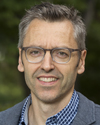
|
Degrees:
Ph.D., Univ. of Washington
M.A., Univ. of Washington
B.A., Western Washington Univ.
Professor Cocco has traditionally taught the history of Italy, early modern Europe, and the Mediterranean. He has written on humanism and seventeenth-century science, on volcanoes and volcanology, on natural history, disasters, and urban history. His first book, Watching Vesuvius (University of Chicago), was published in 2012. His current research and teaching focuses on the ecological humanities (or environmental humanities), and is most interested writing about the borderlands where human and non-human histories overlap in networks of relation. This growth stems from his collaboration with professors Kathleen Kete and Tom Wickman on two courses: HIST 219 Planet Earth and HIST 220 Possible Earths. The book he is writing, called The Octopus and the Others, explores the presence of sea animals in the eighteenth-century metropolis of Naples.
|
-
History of Science
-
Environmental Humanities
-
Italy and the Mediterranean
|
HIST-220
|
Possible Earths: Histories and Cultures of Environmental Thought
|
|
HIST-221
|
Science, Religion, and Nature in the Age of Galileo
|
|
HIST-300
|
History Workshop
|
|
HIST-304
|
Renaissance Italy
|
|
HIST-325
|
Italy and the Mediterranean
|
|
-
Environmental Humanities
-
History of Science
-
Naples, Italy, the Mediterranean
|
SINGLE-AUTHOR BOOKS:
-
Watching Vesuvius: A History of Science and Culture in Early Modern Italy (Chicago: The University of Chicago Press, 2012).
-
The Octopus and the Others: Sea Life in an Eighteenth-Century Metropolis (current book project in progress).
EDITED BOOKS:
- Alfonso Tortora, Domenico Cassano, and Sean Cocco, eds., L'Europa moderna e l'antico vesuvio. Sull'identità scientifica italica tra i secoli XVII e XVIII (Battipaglia: Laveglia e Carlone, 2017).
ARTICLES AND ESSAYS (PEER-REVIEWED):
- “Riflessioni e visioni a distanza, allora e adesso” in Antonino De Natale and Antonino Pollio, I disegni inediti di Domenico Cirillo nella Società dei Naturalisti di Napoli (Naples: Società dei Naturalisti di Napoli, forthcoming).
- “Possible Ecologies of Vesuvian Nature and Arts,” in Frank Fehrenbach and Joris van Gastel, eds., Nature and the Arts in Early Modern Naples (Berlin: De Gruyter, 2020).
- “Baroque Tectonics: Eruptions and Disruptions in the Vesuvian City”, The Open Arts Journal, Issue 6, Winter 2017/2018 (Co-authored with Alfonso Tortora).
- “Abbozzo di nuovi studi sul Vesuvio,” in Alfonso Tortora, Domenico Cassano, and Sean Cocco eds., L'Europa moderna e l'antico vesuvio. Sull'identità scientifica italica tra i secoli XVII e XVIII (Battipaglia: Laveglia e Carlone, 2017).
- “Locating the Sciences in Early Modern Naples,” in Tommaso Astarita, ed., A Companion to Early Modern Naples (Leiden: Brill, 2013).
- “Contesting Vesuvius, Claiming Naples: Disaster in Print and Pen, 1631-1649” in Michael Halverson and Katherine Spierling, eds., Defining Community in Early Modern Europe (Aldershot: Ashgate, 2008).
- “Natural Marvels and Ancient Ruins: Volcanism and the Recovery of Antiquity in Early Modern Naples,” in Victoria Gardner Coates and John L. Seydl, eds., Antiquity Recovered: The Legacy of Pompeii and Herculaneum (New York: Oxford University Press and Getty Trust Publications, 2007).
REVIEWS:
- Review of New Approaches to Naples c. 1500-c. 1800: The Power of Place. Calaresu, Melissa and Helen Hills, eds., (Farnham: Ashgate, 2013). In Sixteenth-Century Journal, Volume XLV, No.4, Winter 2014, 1015-1016.
- Review of David Hawkes and Richard Newhauser, eds., The Book of Nature and Humanity in the Middle Ages and the Renaissance. Arizona Studies in the Middle Ages and the Renaissance (BREPOLS, 2012). In Renaissance Quarterly, Vol. 67, No.3, 979-980.
- Review of Alessandra Foscati, Ignis sacer. Una storia culturale del ‘fuoco sacro’ dall’antichità al Settecento (Firenze: SISMEL, 2013). In Aestimatio 10 (2013), 344-351.
- Review of Jordan Lancaster, In the Shadow of Vesuvius: A Cultural History of Naples (New York: I.B. Tauris, 2005). In Journal of Modern Italian Studies, Vol. 12, Issue 2 (June 2007), 238-237
- Review of Thomas Allison Kirk, Genoa and the Sea, 1559-1684 (Baltimore: Johns Hopkins University Press, 2005). In Sixteenth-Century Journal, Vol. 38, No. 2 (Summer 2007), 546-548.
PAPERS:
- “The Shallows and the Sickly Coast: A History of Menace and Reassurance on an Italian Coast” (Casa Italiana, New York University, April 2017).
- “Locating the Natural Sciences in Naples”, Society for Italian Historical Studies (Chicago, 2012).
- “Trattare naturalmente come storicamente: Philosophical and Historical Approaches to Vesuvius Between the Seventeenth and Eighteenth Centuries”, The Arts and Sciences in Naples (Clark Library, February 2010).
- “The History of Venice: A Thousand Years in One Hour” Academy of Lifelong Learning (Trinity College, November 2009).
- “Vesuvius in the View South” Program in the History and Philosophy of Science Stanford University, April 2009.
- “Castelli Was Tired (and How do I Know)” Writers on Writing Series, Trinity College, April 2008.
- “Arduous Terrain from Afar: Pietro Castelli's Investigation of Nature.” New England Renaissance Conference, Brown University, October 2007.
- “From Mars to Jupiter’s Moons: Italy’s Century Between the Renaissance and Baroque.” Wadsworth Atheneum, Hartford, CT (April, 2007).
- “Science and Religion in the Age of Galileo.” Institute for the Study of Secularism in Society and Culture Teaching Conference, Lenox, MA (May, 2006).
- “Reflections on an Early Modern Ethic of Nature.” International Society for the Study of Religion, Nature, and Culture; University of Florida (April, 2006).
|
- Dibner Research Fellow, Huntington Library (CA), Spring 2009
- Fellow, Institute for the Study of Secularism in Society and Culture, 2005-2006; 2006-2007, Trinity College
- Fellow, Walter Chapin Simpson Center for the Humanities, 2003-2004
- Costigan Fellowship, University of Washington, Spring 2003
- Fellow, Fulbright, Italy, 2000-2001
- Western Europe Dissertation Travel Grant, University of Washington, 2000
|
|
|